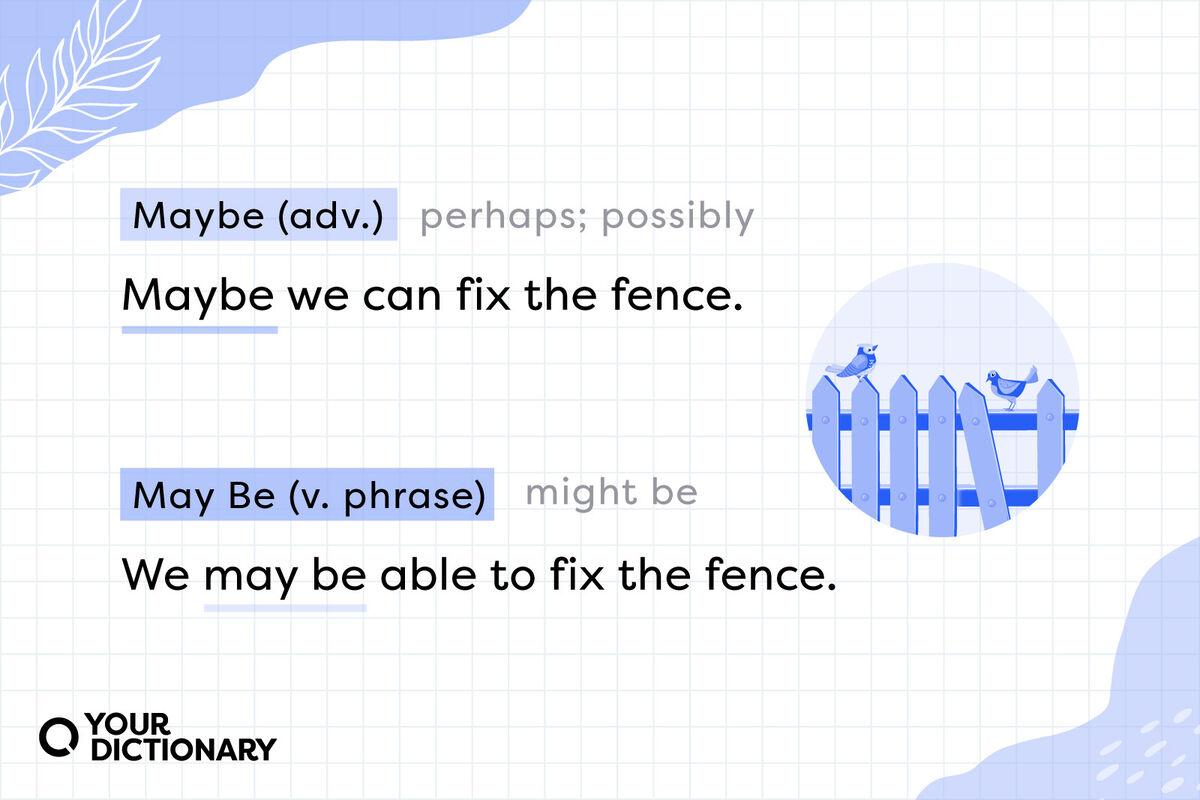
Even though the only thing separating maybe and may be is a space, they have distinct meanings and uses. Remembering what each one means and how they’re used can be difficult for even the brightest scholars of our time.
May Be vs. Maybe Meanings: Different Forms of Possibility
The meanings of maybe and may be are:
- maybe (adv.) - perhaps; possibly (Maybe we can fix the fence.)
- may be (v. phrase) - might be (We may be able to fix the fence.)
The two definitions do share some overlap and relation. Thanks to the root word may, both maybe and may be describe forms of possibility. That's why their sentence positions and grammatical functions are important ways to decide between using may be and maybe.
How To Use ‘Maybe’
When used as an adverb meaning “perhaps” or “possibly,” maybe can go ostensibly anywhere in a sentence: beginning, middle or end.
- Maybe I’ll go to the party after work.
- I’ll stop by home maybe before I head over.
- I could be late, maybe.
Maybe has also become the middle answer between yes and no, so given a yes or no question, maybe can stand on its own.
- “Did you want something from the burger place?” “Maybe.”
How To Use ‘May Be’
Where maybe is an adverb, may be is a verb phrase, specifically a modal verb. You use may be when referring to something that you’re not sure about but could be true or could happen. As a verb phrase, may be always comes after the subject of the sentence.
- You may be asked to give a short speech during the presentation.
- He may be better at sports than he lets on.
- While that may be true, you shouldn’t say it out loud.
When To Use ‘Maybe’ or ‘May Be’
Keep in mind that maybe is an adverb and may be is a verb. However, if you’re having trouble differentiating, use different words.
If you can use possibly or potentially in place of the word, you should use maybe. If you can use might be, you should use may be.
- I'll possibly order a sandwich for lunch. (correct; choose maybe)
- I'll might be order a sandwich for lunch. (incorrect)
- There possibly another solution to our problem. (incorrect)
- There might be another solution to our problem. (correct; choose may be)
- Possibly, the traffic is making Vicky late. (correct; choose maybe)
- Might be the traffic is making Vicky late. (incorrect)
- Mom's missing watch possibly behind the dresser. (incorrect)
- Mom's missing watch might be behind the dresser. (correct; choose may be)
Rewording To Use ‘Maybe’ and ‘May Be’
What’s fun about maybe and may be is that you can reword a sentence to use one or the other. There isn’t any set reason to use one over the other aside from what sounds better to you.
- Maybe I'll order a sandwich for lunch.
- I may be ordering a sandwich for lunch.
- Maybe the traffic is making Vicky late.
- Vicky may be late because of the traffic.
- Maybe Perla is stressed out because of her homework.
- Perla may be stressed out because of her homework.
Sound It Out
When all else fails, read the sentence out loud. If you find yourself putting a natural pause between may and be, that's the correct choice. Read these sentences aloud:
- The principal maybe stopping by. (incorrect)
- The principal may be stopping by. (correct)
- Maybe I'll see you there. (correct)
- May be I'll see you there. (incorrect)
Chances are, the natural rhythm of conversational English might help you choose the right word.